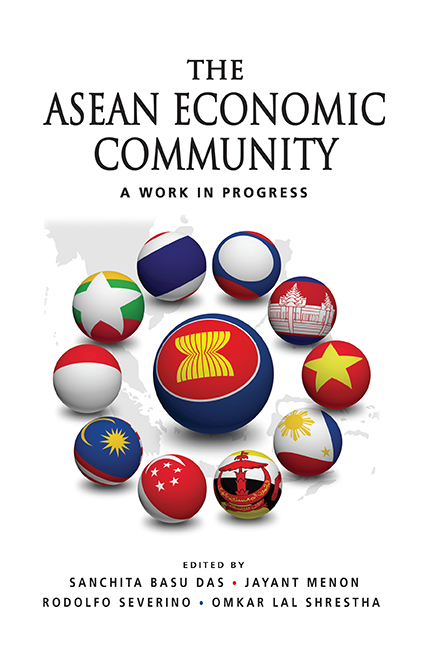Book contents
- Frontmatter
- Contents
- Foreword
- Foreword
- Preface
- acknowledgments
- Abbreviations
- The Contributors
- 1 Overview
- 2 Non-Tariff Barriers: A Challenge to Achieving the ASEAN Economic Community
- 3 ASEAN Trade in Services
- 4 The Asean Economic Community: The Investment Climate
- 5 Competition and Intellectual Property Laws in the ASEAN ‘Single Market’
- 6 Subregional Zones and ASEAN Economic Community
- 7 ASEAN FTAs: State of Play and Outlook for Asean's Regional and Global Integration
- 8 The Asean Dispute Settlement System
- 9 Enhancing the Institutional Framework for AEC Implementation: Designing Institutions that are Effective and Politically Feasible
- 10 ASEAN Economic Community Business Survey
- Index
Foreword
Published online by Cambridge University Press: 21 October 2015
- Frontmatter
- Contents
- Foreword
- Foreword
- Preface
- acknowledgments
- Abbreviations
- The Contributors
- 1 Overview
- 2 Non-Tariff Barriers: A Challenge to Achieving the ASEAN Economic Community
- 3 ASEAN Trade in Services
- 4 The Asean Economic Community: The Investment Climate
- 5 Competition and Intellectual Property Laws in the ASEAN ‘Single Market’
- 6 Subregional Zones and ASEAN Economic Community
- 7 ASEAN FTAs: State of Play and Outlook for Asean's Regional and Global Integration
- 8 The Asean Dispute Settlement System
- 9 Enhancing the Institutional Framework for AEC Implementation: Designing Institutions that are Effective and Politically Feasible
- 10 ASEAN Economic Community Business Survey
- Index
Summary
When the ASEAN Secretariat approached the Asian Development Bank to undertake an analysis of the barriers and impediments in realizing the ASEAN Economic Community by 2015, we were delighted to respond positively, given the importance of the issue and the strong ties between our institutions. We were also delighted to collaborate with the Institute of Southeast Asian Studies to produce this volume, enlisting the support from external experts in the field. With the publication of this book some 2 years before the deadline of 2015, we hope and expect that policy-makers and other stakeholders will have sufficient time to address the issues raised, and meet the challenges identified.
A key message coming out of this volume is that the target date of 2015 should not be viewed as a hard deadline but rather a milestone, albeit important, in a much longer journey. It is a journey that began in 1967, although during its first decade the primary focus of ASEAN was on creating harmony and cohesion within a troubled region, rather than increasing economic integration. But pursuing regional economic integration has gained prominence in ASEAN affairs over succeeding decades. From the initial focus on trade liberalization, through the Preferential Trading Arrangement and eventually the ASEAN Free Trade Agreement (AFTA), ASEAN's regional economic integration agenda has broadened to now include services trade, investment, labor migration, and even macroeconomic policy. ASEAN's regional economic integration efforts are meant to culminate in the creation of an ASEAN Economic Community, one of the three pillars of the ASEAN Community espoused in ASEAN's Vision 2020 — the other two being the Political-Security Community and the Socio-Cultural Community.
Whatever is realized come 2015, the work must continue beyond it. ASEAN's own assessments, based on its scorecards, suggest that many of the targets will not be met by this date. The challenges identified in this volume support this conclusion. But more importantly, the agreements that have been signed, before and after this date, must be implemented legitimately. Often effective implementation will require domestic rules and regulations to be amended in order to accommodate the agreed protocols. Monitoring at this stage is often guided by little more than goodwill, and this too poses obvious challenges. Therefore, it is critical that member countries are convinced that the reforms that they agree to will be in their self-interest.
- Type
- Chapter
- Information
- The ASEAN Economic CommunityA Work in Progress, pp. ix - xPublisher: ISEAS–Yusof Ishak InstitutePrint publication year: 2013



